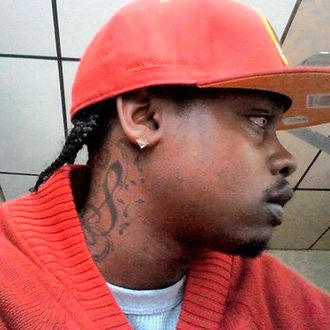
Akai Gurley’s death became something of a footnote at the end of 2014, overshadowed by the uproar over the non-indictment in the Eric Garner case, the murder of two cops, and the ugly diatribe of a police union leader. Reverend Al Sharpton dropped out of the memorial service after some members of Gurley’s brokenhearted family said they didn’t want the somber ceremony turned into a political event. So on a bitterly cold and wet morning, Gurley was buried quietly.
That changed this afternoon, when a Brooklyn grand jury indicted the cop who fired the shot that killed Gurley. Now the case is a very big deal.
All of the controversial deaths at the end of last year were tragic, but in some ways, Gurley’s was the saddest — he appears to have been a victim of incompetence and a broken policy more than anything else. The 28-year-old was minding his own business in a dark East New York housing project stairwell — “a total innocent,” in the words of police commissioner Bill Bratton — when a rookie cop apparently used the same hand to hold a gun and open a door. Peter Liang fired one shot and it hit Gurley in the chest.
Today, press releases started flying even before Brooklyn D.A. Ken Thompson made any official announcement. “No matter the specific charges, this case is an unspeakable tragedy for the Gurley family,” Mayor Bill de Blasio said. “We urge everyone to respect the judicial process as it unfolds.” Interestingly, the mayor’s recently hotheaded antagonist, Patrolmen’s Benevolent Association president Pat Lynch, was also notably restrained: “The fact [officer Peter Liang] was assigned to patrol one of the most dangerous housing projects in New York City must be considered among the circumstances of this tragic accident.”
There will nevertheless be plenty of inflammatory political and racial interpretations of why Liang was indicted and officer Daniel Pantaleo wasn’t in the Garner chokehold case: that Thompson, who is African-American, was intent on proving himself in his first truly high-profile police case, and that the Brooklyn grand jury likely included more black members. Lynch’s muted tone, though, is either laudable restraint, or an interesting sign that he knows he lost this winter’s public-opinion battle with the mayor.
The timing of de Blasio’s budget announcement yesterday, with millions in NYPD-friendly new spending, now looks either very smart or very fortuitous. Yet even cops who appreciate the new bulletproof vests, and who deplore the alleged bungling of one of their colleagues, view the Brooklyn indictment as something of a make-up call for what didn’t happen on Staten Island. “The guy who deserved to get indicted didn’t, and the guy who screwed up probably will,” one cop told me several weeks ago.
The death of Akai Gurley will finally get the attention it deserves. Beyond the guilt or innocence of Peter Liang, though, the best thing it could help decide are the thorny questions about how the NYPD should protect the neighborhoods that need it the most.





























